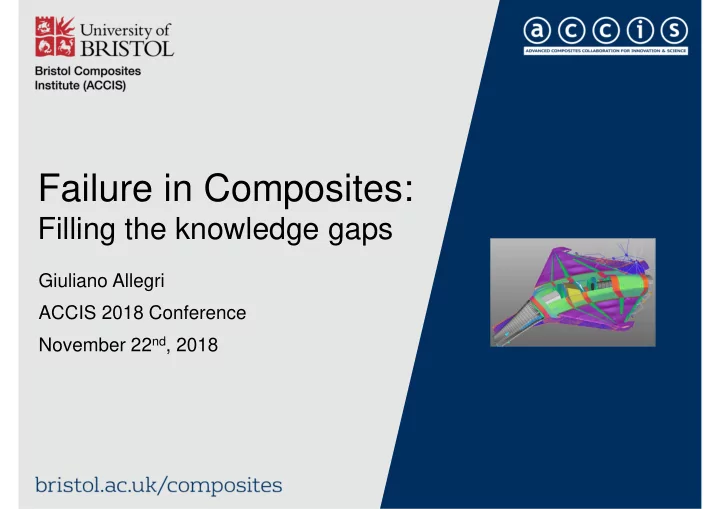

1 Failure in Composites: Filling the knowledge gaps Giuliano Allegri ACCIS 2018 Conference November 22 nd , 2018
2 Failure of Composites • Scopus search - Title-Abs-Key ( composites AND failure AND ( delamination OR interlaminar OR translaminar OR intralaminar ) ) • 7000 + papers! ACCIS 2018 Conference 22/11/2018
3 Failure of Composites • Scopus search - Title-Abs-Key ( composites AND failure AND ( delamination OR interlaminar OR translaminar OR intralaminar ) ) • 7000 + papers! Carbon fiber m arket volum e by region, 20 14 - 20 25 (Tons/ Tons @ 20 14) x 3 x 2 ACCIS 2018 Conference 22/11/2018
4 No Growth Design Philosophy (CHM-17) • Substantiated by pyramid of testing • Knockdowns dictated by uncertainty (A- or B-basis) • Compound knockdowns for environmental effects (temperature & humidity) • No growth implies no “lifing” – fatigue accounted for via static strength knockdowns Current Probability Test backed up by Analysis A ‐ Basis B ‐ Basis Components Sub-components Specific features Generic features Strength Coupons Test Analysis ACCIS 2018 Conference 22/11/2018
5 Beyond No Growth Design • Analysis backed up by testing (“virtual testing”) • Data-rich approach to experimental testing (e.g. DIC + inverse FEM) • Probabilistic assessment of structural integrity (e.g. stochastic FEM) • Proper “lifing” of components (akin to ”damage tolerance” for metals) • Structural health monitoring Future Current Test backed up by Analysis Analysis backed up by Test Components Sub-components Specific features Generic features Coupons Test Analysis Test Analysis ACCIS 2018 Conference 22/11/2018
6 Fatigue Damage Growth • Delamination responsible for 60% of failure in composite structures (US DoD) • Delamination initiate at interlaminar stress risers (e.g. free edges, ply drop-offs) • Strongly dependent on environmental effects (1) Micro ‐ Cracking (2) Delamination (3) Fibre ‐ Failure (3) (1) (2) ACCIS 2018 Conference 22/11/2018
7 Fatigue Delamination Growth • Usually described by semi-empirical equations (e.g. Paris law) da dN CG max b • C and b dependent on: stress-ratio, mode-mixity, frequency, temperature, moisture, ageing…. Can such a problem be described using machine learning? ACCIS 2018 Conference 22/11/2018
8 Fatigue Delamination Growth A Neural Network Approach 1. Buckingham theorem (1914): similitude underlined by non-dimensional governing parameters 2. Single Hidden-Layer Neural Network (SLHNN) trained via Extreme Learning (Huang, 2006) – it can represent (semi-)monotonicity constraints (embedding previous physical knowledge) (1) w 1 c 1 f (2) w c 2 1 (3) + w 1 s Y (1) w N (2) Z w N c N (3) w N Hidden Layer Allegri G., Modelling fatigue delamination growth in fibre ‐ reinforced composites: Power ‐ law equations or artificial neural networks?, Materials and Design; 155, 59 ‐ 70, 2018 ACCIS 2018 Conference 22/11/2018
9 Fatigue Delamination Growth A Neural Network Approach • Training performed in 0.1s on a standard desktop PC • Application example to fatigue delamination growth in T800H/#3631 G. Allegri., Modelling fatigue delamination growth in fibre ‐ reinforced composites: Power ‐ law equations or artificial neural networks?, Materials and Design; 155, 59 ‐ 70, 2018 ACCIS 2018 Conference 22/11/2018
10 Delamination Suppression Through-thickness Reinforcement (TTR) • Strong enhancement of interlaminar fracture toughness (40x mode I; 4x mode II) • Multi-scale modelling of delamination bridging via z-pins Cartie’ (2000) 40 (kJ/m 2 ) 30 20 G * 10 0 0.0 0.2 0.4 0.6 0.8 1.0 G. Mohamed, G. Allegri, M. Yasaee, S.R. Hallett, Cohesive element formulation for z ‐ pin delamination bridging in fibre reinforced laminates, International Journal of Solids and Structures; 132: 232 ‐ 44, 2018 ACCIS 2018 Conference 22/11/2018
11 Structural Health Monitoring via TTR • Through-thickness reinforcement (TTR) toughens the host material • Multifunctionality: TTR (z-pins) can be employed for detecting delamination in- situ! ACCIS 2018 Conference 22/11/2018
12 Structural Health Monitoring via TTR • Through-thickness reinforcement (TTR) toughens the host material • Multifunctionality: TTR (z-pins) can be employed for detecting delamination in- situ! • Demonstration on ASTM-standard coupons B. Zhang, G. Allegri, M. Yasaee, S.R. Hallett, I.K. Partridge, On the Delamination Self ‐ Sensing Function of Z ‐ Pinned Composite Laminates, Composites Science & Technology; 128: 138 ‐ 46, 2016. B. Zhang, G. Allegri, S.R. Hallett, An Investigation into Multi ‐ Functional Z ‐ pinned Composite Laminates, Materials & Design; 108: 679 ‐ 88, 2016. ACCIS 2018 Conference 22/11/2018
13 Structural Health Monitoring via TTR • Through-thickness reinforcement (TTR) toughens the host material • Multifunctionality: TTR (z-pins) can be employed for detecting delamination in-situ! • Demonstration on ASTM-standard DCB coupons B. Zhang, G. Allegri, M. Yasaee, S.R. Hallett, I.K. Partridge, On the Delamination Self ‐ Sensing Function of Z ‐ Pinned Composite Laminates, Composites Science & Technology; 128: 138 ‐ 46, 2016. B. Zhang, G. Allegri, S.R. Hallett, An Investigation into Multi ‐ Functional Z ‐ pinned Composite Laminates, Materials & Design; 108: 679 ‐ 88, 2016. ACCIS 2018 Conference 22/11/2018
14 Acknowledgements • The author would like to acknowledge Rolls-Royce plc for their support of this research through the Composites University Technology Centre at the University of Bristol, UK ACCIS 2018 Conference 22/11/2018
15 Thank you for you attention! giuliano.allegri@bristol.ac.uk
Recommend
More recommend